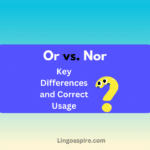When you’re writing about employment or job schedules, you might come across the question: should I use “Full-Time or Full Time”? It’s a common source of confusion for many people, and it’s important to get it right for clear and accurate communication. In this article, we will explore the key differences between “Full-Time or Full Time” explain when and how to use each form, and provide writing tips to help clarify the confusion. By the end of this article, you’ll have a solid understanding of the correct usage of these terms, making your writing more accurate and professional.
Why Is There Confusion?
The confusion between “Full-Time or Full Time” arises from the way compound words are formed in the English language. A compound word is a combination of two or more words that work together to form a single meaning. However, whether to use a hyphen or not in these compound words depends on their grammatical function in a sentence. This has led to a lot of ambiguity in both casual and formal writing. The trend of hyphenating compound adjectives or adverbs has become more common, but it’s essential to know when this rule applies.
When full time is used as a noun (for example, to describe a type of job schedule), it’s written without a hyphen. On the other hand, when it functions as an adjective or adverb (such as when it describes a job or position), a hyphen is needed, resulting in full-time. This key distinction is the main reason for the confusion, and understanding this rule can help clear up the misunderstanding.
What Does “Full Time” Mean?
Full time, when used as a noun, refers to the expected amount of hours someone works. Typically, this means working a complete schedule or standard hours—often around 40 hours a week. For instance, someone who works full time is expected to be employed for the regular hours of the company or job, rather than working on a part-time basis.
For example, in the sentence “She works full time,” the term describes a work schedule. It focuses on the amount of time worked rather than the characteristics of the work itself. Here, full time is a noun that simply describes a work schedule. Understanding this definition will help you avoid mix-ups when deciding which form of the word to use.
What Does “Full-Time” Mean?
Full-time, with a hyphen, is used as an adjective or adverb to describe something related to the job or work itself. When we say full-time job or full-time employee, the hyphen shows that we are modifying a noun (such as “job” or “employee”) with the idea of working for an extended, continuous period. This use highlights the nature or commitment of the role.
For example, in the sentence “He has a full-time job,” the term full-time modifies the noun “job,” explaining that the job requires an entire workweek of commitment. Similarly, you might say “She works full-time” to indicate that her employment status requires her to work an uninterrupted, permanent schedule. This use of the hyphen ensures that the phrase functions smoothly as a compound adjective.
Which One Should You Use: “Full-Time or Full Time”?
The right usage of full time vs. full-time boils down to its grammatical function in the sentence. If you’re referring to the amount of work or time, you should use full time (without the hyphen). If you’re describing the work itself or the position, use full-time (with the hyphen). In this way, the hyphen helps clarify whether you’re referring to a job description or simply the work schedule.
To make it even clearer, here’s a quick guide:
| Usage | Full Time | Full-Time |
|---|---|---|
| Definition | Used as a noun, describing the amount of time worked. | Used as an adjective or adverb to describe a position, job, or schedule. |
| Grammar Rule | No hyphen when used as a noun. | Hyphenated when used as an adjective or adverb. |
| Example Sentences | “She works full time.” | “He has a full-time job.” |
| Context | Refers to the duration or amount of time worked. | Describes the type of job, schedule, or position. |
| Usage in Writing | Common in discussions about working hours or schedules. | Common in job descriptions or when qualifying a noun. |
Use “Full Time” (Without a Hyphen) When It’s a Noun
When full time functions as a noun, it describes the type of work schedule or the commitment level. It’s about the expected amount of time someone will work in a job. Here, the term full time is not modifying any other noun; instead, it’s standing alone to describe a job or employment status. The term doesn’t need a hyphen because it’s a basic noun phrase.
For example, when you say “He works full time,” you’re stating that he works a complete schedule, typically expected in most full-time roles. The same applies in the sentence “She’s looking for full time in marketing.” The phrase simply refers to a job that requires a standard workweek of hours.
Use “Full-Time” (With a Hyphen) When It’s an Adjective or Adverb
When the term is used to describe something, as in a full-time job or full-time employment, the hyphen is necessary. The hyphen links the two words into a compound adjective, showing that the term modifies the noun that follows. Similarly, when used as an adverb, such as “She works full-time”, it indicates the extent of the work, meaning she works continuously or for the full workweek.
For example, in “He is a full-time employee,” the hyphen connects the two words to show they work together to describe the employee’s job status. The same applies when someone is described as working full-time: it tells us about their employment status and the anticipated quantity of hours they work.
Synonyms for “Full-Time or Full Time”
Both full time and full-time have alternative words or phrases that can be used depending on the context. These synonyms can add variety to your writing while maintaining the same meaning.
For full time, synonyms include permanent, regular hours, and standard hours, all of which suggest a consistent, complete schedule. For example, “She’s looking for a regular position” or “He prefers permanent work.”
When used as an adjective or adverb, full-time can be replaced with words like continuous, uninterrupted, or entire, such as “He works a continuous schedule” or “She has an uninterrupted job.”
Examples in Context
To make sure you understand how to use these terms correctly, here are some usage examples in different scenarios.
Examples Using “Full Time” (Noun)
In the sentence “She works full time,” the phrase is a noun, referring to the total number of hours she works. It could also be used as in “She’s looking for full time in marketing.” Here, the phrase is used to describe the kind of job or schedule she’s seeking, with no hyphen.
Examples Using “Full-Time” (Adjective/Adverb)
When you say “He has a full-time job,” you are using full-time to describe the job itself. It means that the job requires standard hours and a complete schedule. Similarly, “She works full-time hours” tells us that her work is continuous and doesn’t have breaks or part-time status.
Etymology of “”Full-Time or Full Time””
Both full time and full-time have their roots in the English language. With the components of the words evolving to their current forms. The term full time first emerged as a way to describe a complete work schedule.
The hyphenated form, full-time, started appearing when language rules began emphasizing the need for clarity in written communication. Hyphenated words help link ideas and make meanings clearer, particularly in complex or compound phrases.
Etymology of “Full Time”
The word full comes from the Old English word “full”, meaning complete or entire. The term time has been used for centuries to refer to the period or duration something occurs. Over time, full time came to describe a job or position requiring an entire, uninterrupted work schedule.
Etymology of “Full-Time”
The addition of the hyphen in full-time likely came from the need for clearer distinctions between compound words. As English grammar became more formalized, hyphenation helped clarify when words were intended to work together as a single concept. In this case, the hyphenated form full-time emphasizes the idea of a consistent or permanent schedule.
Conclusion of “Full-Time or Full Time”
In conclusion, whether to use “Full-Time or Full Time” depends on its grammatical function. If you’re referring to the amount of work or the schedule itself, use full time without the hyphen. However, if you’re describing the nature of the job or position, use full-time with the hyphen. Understanding these key differences will help you avoid confusion and improve your writing accuracy.
When in doubt, remember the rules about hyphenation and compound adjectives—they will guide you in making the right choice.
Sources
- GrammarHow: This article explains when to use “full time” without a hyphen and when to use “full-time” with a hyphen, providing clear examples and guidance.
- Grammar Palette: This resource offers a comprehensive overview of the differences between “full time” and “full-time,” including their grammatical functions and correct usage in sentences.
- English Recap: This article discusses the correct usage of “full time” and “full-time,” highlighting the importance of hyphenation in compound adjectives and providing practical examples.







